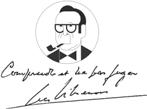










‘I love reading Simenon. He makes me think of Chekhov’ – William Faulkner
‘A truly wonderful writer . . . marvellously readable – lucid, simple, absolutely in tune with the world he creates’ – Muriel Spark
‘Few writers have ever conveyed with such a sure touch, the bleakness of human life’ – A. N. Wilson
‘One of the greatest writers of the twentieth century . . . Simenon was unequalled at making us look inside, though the ability was masked by his brilliance at absorbing us obsessively in his stories’ – Guardian
‘A novelist who entered his fictional world as if he were part of it’ – Peter Ackroyd
‘The greatest of all, the most genuine novelist we have had in literature’ – André Gide
‘Superb . . . The most addictive of writers . . . A unique teller of tales’ – Observer
‘The mysteries of the human personality are revealed in all their disconcerting complexity’ – Anita Brookner
‘A writer who, more than any other crime novelist, combined a high literary reputation with popular appeal’ – P. D. James
‘A supreme writer . . . Unforgettable vividness’ – Independent
‘Compelling, remorseless, brilliant’ – John Gray
‘Extraordinary masterpieces of the twentieth century’ – John Banville
Georges Simenon was born on 12 February 1903 in Liège, Belgium, and died in 1989 in Lausanne, Switzerland, where he had lived for the latter part of his life. Between 1931 and 1972 he published seventy-five novels and twenty-eight short stories featuring Inspector Maigret.
Simenon always resisted identifying himself with his famous literary character, but acknowledged that they shared an important characteristic:
My motto, to the extent that I have one, has been noted often enough, and I’ve always conformed to it. It’s the one I’ve given to old Maigret, who resembles me in certain points . . . ‘understand and judge not’.
Translated by shaun whiteside
UK | USA | Canada | Ireland | Australia
India | New Zealand | South Africa
Penguin Classics is part of the Penguin Random House group of companies whose addresses can be found at global.penguinrandomhouse.com.
Penguin Random House UK
One Embassy Gardens, 8 Viaduct Gardens, London SW 11 7 BW penguin.co.uk
First published in French as Mon ami Maigret by Presses de la Cité 1949
This translation fi rst published 2016
Published in Penguin Classics 2025 001
Copyright © Georges Simenon Limited, 1949
Translation copyright © Shaun Whiteside, 2016


GEORGES SIMENON and ® , all rights reserved
MAIGRET ® Georges Simenon Limited, all rights reserved original design by Maria Picassó i Piquer

All rights reserved
The moral rights of the author and translator have been asserted Penguin Random House values and supports copyright. Copyright fuels creativity, encourages diverse voices, promotes freedom of expression and supports a vibrant culture. Thank you for purchasing an authorized edition of this book and for respecting intellectual property laws by not reproducing, scanning or distributing any part of it by any means without permission. You are supporting authors and enabling Penguin Random House to continue to publish books for everyone. No part of this book may be used or reproduced in any manner for the purpose of training artificial intelligence technologies or systems. In accordance with Article 4(3) of the DSM Directive 2019/790, Penguin Random House expressly reserves this work from the text and data mining exception.
Typeset by Palimpsest Book Production Limited, Falkirk, Stirlingshire
Printed and bound in Great Britain by Clays Ltd, Elcograf S.p.A.
The authorized representative in the EEA is Penguin Random House Ireland, Morrison Chambers, 32 Nassau Street, Dublin D 02 YH 68
A CIP catalogue record for this book is available from the British Library
ISBN : 978–0–241–20639–3
Penguin Random House is committed to a sustainable future for our business, our readers and our planet. This book is made from Forest Stewardship Council® certified paper.
‘So you were in the doorway of your establishment?’
‘Yes, inspector, sir.’
There was no point going over it all again. Four or five times Maigret had tried to persuade him to say just ‘inspector’. What did it matter? What did any of it matter?
‘A grey car, a big sports car, stopped for a moment, and a man got out, almost acrobatically, is that what you said?’
‘Yes, inspector, sir.’
‘To get into your club he had to pass right in front of you, and he even jostled you slightly. And yet, over the door there is a neon sign.’
‘It’s purple, inspector, sir.’
‘So?’
‘So nothing.’
‘It’s because your sign is purple that you’re incapable of recognizing the individual who, a moment later, opened the velvet door and emptied his revolver into your barman?’
The man’s name was Caracci or Caraccini (Maigret had to consult the file each time). He was short (he wore high heels), had the face of a Corsican (they all look a bit like Napoleon) and had an enormous yellow diamond on his finger.
It had been going on since eight o’clock in the morning
and it was now striking eleven. It had even, in fact, been going on since the middle of the night, because everyone they had picked up on Rue Fontaine, in the club where the barman had been killed, had spent the night at the station. Three or four inspectors, including Janvier and Torrence, had already dealt with Caracci, or Caraccini, without getting anything out of him.
Even though it was May, it had been raining as if it was the depths of autumn. It had been raining like that for four or five days, and the roofs, the window-sills, the umbrellas bore reflections like the water of the Seine, which the inspector saw when he lowered his head.
Mr Pyke didn’t move. He stayed sitting on his chair, in a corner, as stiff as if he was in a waiting room, and it was starting to get exasperating. His eyes, slowly, moved from the inspector to the little man and from the little man to the inspector, and it was impossible to guess what was going on in the English policeman’s brain.
‘You know, Caracci, that your attitude could cost you dear, and that your club could easily be closed for good?’
The Corsican, unintimidated, gave Maigret an almost complicit glance, smiled and with his ringed finger smoothed the black commas of his moustache.
‘I have always been law-abiding, inspector, sir. Just ask your colleague Priollet.’
Even though there had been a death, this case was in fact the concern of Inspector Priollet, head of the Drug Squad, because of the particular milieu in which it had taken place. Unfortunately Priollet was in the Jura, at the funeral of some relative or other.
‘So you’re refusing to speak?’
‘I’m not refusing, inspector, sir.’
Maigret, heavily, gruffly, went and opened the door.
‘Lucas! Give him another going-over.’
Oh! The look that Mr Pyke fixed on him! Mr Pyke might have been the nicest man on earth, but there were moments when Maigret surprised himself by hating him. Just as he did with his brother-in-law, whose name was Mouthon. Once a year, in the spring, Mouthon disembarked at the Gare de l’Est in the company of his wife, Madame Maigret’s sister.
He too was the nicest man on earth; he wouldn’t have hurt a fly. As for his wife, she was gaiety personified, and as soon as she arrived at the apartment on Boulevard RichardLenoir she grabbed an apron to help with the housework. On the first day it was perfect. On the second day, it was almost as perfect.
‘We’re leaving tomorrow,’ Mouthon would announce. ‘Oh, no! Oh, no!’ Madame Maigret would reply. ‘Why leave so soon?’
‘We don’t want to get in the way.’
‘Never in a thousand years!’
Maigret too would announce with great conviction: ‘Never in a thousand years!’
On the third day he would be wishing that some unexpected job would come up to stop him having dinner at home. And yet never, since his sister-in-law had married Mouthon and the couple came to see them every year, never, ever, had one of those affairs that keep you away from home for days and nights on end come up at that exact moment.
By the fifth day he and his wife would be exchanging desperate glances, and the Mouthons would stay for nine days, invariably pleasant, charming, considerate, as discreet as anyone could be, so that you ended up reproaching yourself even more for coming to hate them. It was the same with Mr Pyke. However, it had only been three days since he had accompanied Maigret on all his comings and goings. Once, during the holidays, they had said carelessly to the Mouthons: ‘Why don’t you come and spend a week in Paris in the spring? We have a spare room that is always empty.’
They had come.
Likewise, a few weeks before, the chief of police had paid an official visit to the lord mayor of London. The mayor had shown him around the offices of the celebrated Scotland Yard, and the chief of police had been pleasantly surprised to note that the senior officers of the English police knew Maigret by reputation and were interested in his methods.
‘Why not come and see him work?’ the excellent fellow had asked.
They had taken him at his word. Like the Mouthons. Inspector Pyke had been sent, and for three days he had been following Maigret everywhere, as discreetly and as efficiently as it was possible to be. But he was still there.
In spite of his thirty-five or forty years, he looked so young that he might have been taken for a serious student. He was clearly intelligent, perhaps even acutely so. He looked, listened and thought. He thought so much that you could almost hear him think, and it became tiring. It
was a little as if Maigret had been placed under observation. All his gestures, all his words had been picked over inside the skull of the impassive Mr Pyke.
And yet for three days there had been nothing interesting to do. Routine. Paperwork. Uninteresting interrogations, like that of Caracci.
They had reached a silent understanding, he and Pyke. For example, just as the nightclub owner had been brought into the inspectors’ office, and the door carefully closed behind him, the Englishman gave him an unambiguous look:
‘A beating?’
Probably, yes. You don’t treat people like Caracci with kid gloves. And afterwards? It didn’t matter. The case was entirely uninteresting. The barman was probably killed because he had stepped out of line, or because he was a member of a rival gang.
Periodically fellows like that settle their scores and kill each other, and basically it is good riddance.
Whether Caracci spoke or not, sooner or later someone would spill the beans, probably an informer. Do they have informers in England?
‘Hello . . .! Yes . . . It’s me . . . Who . . .? Lechat . . .? Don’t know him . . . Where did you say he’s calling from . . .? Porquerolles . . .? Pass him to me . . .’
The Englishman’s eye was still fixed on him like the eye of God in the story of Cain.
‘Hello . . .! I can’t hear you . . . Lechat . . .? Yes . . . Good . . . Yes, I got that . . . Porquerolles . . . I got that too . . .’
With the receiver to his ear, he watched the rain
trickling down the window panes and thought that there might be some sun in Porquerolles, a little Mediterranean island off the coast of Hyères and Toulon. He had never been there but he had often been told about it. People came back from there brown as Bedouins. In fact, it was the first time he had been telephoned from an island, and he reflected that the telephone wires must run under the sea.
‘Yes . . . What . . .? A little fair-haired fellow, in Luçon . . . Yes, in fact, I do remember . . .’
He had known an Inspector Lechat when, after some quite complicated administrative matters, he had been sent for a few months to Luçon, in the Vendée.
‘Now you’re part of the Draguignan flying squad, I see . . . And you’re calling me from Porquerolles . . .’
There was crackling on the line. Every now and again girls could be heard talking to each other from one city to another.
‘Hello! Paris . . . Paris . . . Hello! Paris . . . Paris . . .’
‘Hello! Toulon . . . Is that you, Toulon? Hello! Toulon . . .’
Did phones work better on the other side of the Channel? Mr Pyke listened impassively and looked at him, and, to maintain his composure, Maigret fiddled with a pencil.
‘Hello . . .! Do I know someone called Marcellin . . .?
Which Marcellin . . .? What . . .! A fisherman . . .? Try to speak clearly, Lechat . . . I’m not getting a word . . . Someone who lives on a boat . . . Fine . . . So . . .? He claims he’s a friend of mine . . .? Eh . . .? He claimed . . .? He’s dead . . .? He was killed last night . . .? It has nothing to do with me, dear Lechat . . . It’s not my area . . . He talked about
me all evening . . .? And you’re telling me that’s why he’s dead . . .?’
He had set down his pencil and was trying to relight his pipe with his free hand.
‘I’m taking a note of that, yes . . . Marcel . . . not Marcellin any more . . . As you wish . . . P for Paul . . . A for Arthur . . . C for cinema . . . yes . . . Pacaud . . . Have you sent the fingerprints . . .? A letter from me . . .? Headed paper . . .?
Headed with what . . .? Brasserie des Ternes . . . It’s possible . . . and what did I write on it . . .?’
If only Mr Pyke hadn’t been there, stubbornly staring at him!
‘I’ll transcribe, yes . . . “Ginette is leaving tomorrow for the sanatorium. She sends you a hug. Best wishes . . .” And it’s signed Maigret . . .? No, it isn’t necessarily a forgery . . . I think I remember something . . . I’m going up to Records . . . Go down there . . .? You know very well that it isn’t anything to do with me . . .’
He was about to hang up but he couldn’t help asking a question, at the risk of surprising Mr Pyke.
‘Is it sunny, where you are . . .? There’s a mistral blowing . . .? But it’s sunny . . .? Fine . . . As soon as I know anything I’ll call you back . . . I promise . . .’
Mr Pyke didn’t ask many questions but he had a way of looking that forced Maigret to speak.
‘You know the island of Porquerolles?’ he said, lighting his pipe at last. ‘Apparently it’s very beautiful, it’s as beautiful as Capri and the Greek islands. A man was killed there last night, but it’s not my area. A letter from me was found on his boat.’
‘Is it really from you?’
‘It’s likely. The name Ginette rings a vague bell. Will you come with me?’
Mr Pyke knew his way around the offices of the Police Judiciaire, having been given the guided tour. In single file, they went up to the attic, where the files of everyone who came before the law were kept. Maigret almost suffered from an inferiority complex, and he was ashamed of the aged employee in long grey overalls who was sucking on Parma violets.
‘Tell me, Langlois . . . By the way, is your wife better?’
‘It wasn’t my wife, Monsieur Maigret, it was my motherin-law.’
‘Ah! Of course. Forgive me . . . Has she had the operation?’
‘She came home yesterday.’
‘Could you see if you have anything in the name of Marcel Pacaud? With a d at the end.’
Were things better in London? They could hear the rain drumming on the roof and rushing into the gutters.
‘Marcel?’ the clerk asked, perched on a ladder.
‘That’s the one. Pass me his file.’
Apart from the fingerprints, it contained a full-face photograph and one in profile, without a collar, without a tie, in the harsh light of the Criminal Records office.
‘Pacaud, Marcel-Joseph-Étienne, born in Le Havre, sailor.’
Maigret, frowning and staring at the photographs, tried to remember. The man had been thirty-five when the
photographs were taken. He was thin and unhealthylooking. A bruise above his right eye seemed to suggest that he had been seriously interrogated before being handed over to the photographer.
It was followed by quite a long list of sentences. In Le Havre, at the age of seventeen, aggravated assault. In Bordeaux a year later, more aggravated assault, along with drunkenness in a public place. Resisting arrest. Aggravated assault again in a place of ill repute in Marseille.
Maigret held the file in such a way as to let his English colleague read at the same time as him, and Mr Pyke showed no surprise, seeming to say, ‘We have this on the other side of the water as well.’
‘Procuring . . .’
Did they have that too? It meant that Marcel Pacaud had worked as a pimp. And as a result, he had been sent to do his military service with the Battalions of Light Infantry of Africa.
‘Aggravated assault, in Nantes . . .’
‘Aggravated assault, in Toulon . . .’
‘A brawler,’ Maigret said simply to Mr Pyke. Then things became serious.
‘Paris. Client theft.’
‘What’s that?’
How to explain such a thing to someone from what’s probably the most prudish nation on earth!
‘It’s a kind of theft, but it’s a theft committed in particular circumstances. When a gentleman goes with a lady he doesn’t know to a more or less seedy hotel and then
complains that his wallet is missing, that’s called client theft. The lady almost always has an accomplice, you understand?’
‘I understand.’
There were three accusations of this type of theft in Marcel Pacaud’s file, and each one mentioned a certain Ginette.
Then things became still more serious, with a knife attack that Pacaud was supposed to have made on a recalcitrant client.
‘I think we might be talking about bad guys here?’ suggested Mr Pyke, whose French was terribly nuanced, so nuanced that it was capable of irony.
‘Exactly. I wrote to him, I remember. I don’t know how such things are done in your country.’
‘Very correctly.’
‘I don’t doubt it. Here we sometimes knock them about. We’re not always nice to them. But the funny thing is that they rarely resent us for it. They know we’re doing our job. From interrogation to interrogation, we end up knowing each other.’
‘Is he the one who said you were his friend?’
‘I’m sure he meant it. I particularly remember his daughter, and what reminds me of her the most is the headed paper. If we have a chance I’ll show you the Brasserie des Ternes. It’s very comfortable, and the sauerkraut is excellent. Do you like sauerkraut?’
‘Now and then,’ the Englishman replied unenthusiastically.
‘In the afternoon and evening there are always some
ladies sitting by a pedestal table, and that’s where Ginette worked. She was a Breton, from a village near St Malo. She had started as a maid working for a local butcher. She adored Pacaud, and he was moved to tears when he talked about her. Does that surprise you?’
Nothing surprised Mr Pyke, whose face showed no emotion.
‘I took a bit of a passing interest in them. She was riddled with tuberculosis. She had never wanted to have treatment because it would have taken her away from her Marcel. When he was in jail, I persuaded her to go and see one of my friends, a lung specialist, and he had her admitted to a sanatorium in Savoie. That’s all.’
‘Is that what you wrote to Pacaud?’
‘Yes, exactly. Pacaud was in Fresnes, and I didn’t have time to go there.’
Maigret handed the file back to Langlois and set off down the stairs.
‘Shall we have a spot of lunch?’
It was yet another problem, almost a moral dilemma. If he took Mr Pyke for lunch in too fancy a restaurant, he risked giving his colleagues from the other side of the Channel the impression that the French police spends most of its time having blow-outs. If, on the other hand, he took him to a cheap café, he might be accused of stinginess.
The same went for aperitifs. To have them? Not to have them?
‘Do you think you’ll go to Porquerolles?’
Did Mr Pyke fancy a trip to the South of France?
‘That’s not up to me. Theoretically I have no business outside of Paris and the département of the Seine.’
The sky was grey, a miserable, hopeless grey, and even the word mistral assumed a tempting sound.
‘Do you like tripe?’
He took him to Les Halles for tripes à la mode de Caen and crêpes Suzette served on pretty brass plate-warmers.
‘This is what we call a slack day.’
‘So do we.’
What must the man from Scotland Yard think of him? He had come to study the ‘Maigret methods’, and Maigret had no method. All he found was a fat, rather clumsy man, who must have seemed to him like the prototype of a French civil servant. For how long was he going to follow him about like that?
At two o’clock they were back at Quai des Orfèvres, and Caracci was still there, in the glass cage-like room that served as a waiting room. It meant that they hadn’t got anything out of him, and they were going to question him again.
‘Has he eaten?’ asked Mr Pyke.
‘I don’t know. Maybe. Sometimes they take them up a sandwich.’
‘And the other times?’
‘They let them starve for a while to help them remember.’
‘The chief wants you, detective chief inspector.’
‘Will you excuse me, Mr Pyke?’
That was something at least. The other man wouldn’t follow him into the chief’s office.